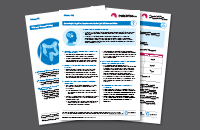 Full Guidelines
Full Guidelines
Click here to view article

 Tools
Tools


 Additional Documents
Additional Documents
Click here to see additional documents

 Endorsements
Endorsements
This Clinical Practice Guideline has been endorsed by the College of Family Physicians of Canada (CFPC).

 Calculate by QxMD
Calculate by QxMD
This guideline and KT tool(s) are available on QxMD. Click here to download the app.
The Task Force released draft recommendations for breast cancer screening in 2024. The 2011 and 2018 clinical practice guidelines are no longer current. Please click here to view the updated draft recommendations for breast cancer screening.
Recommendations on screening for breast cancer in women 40-74 years of age who are not at increased risk
This guideline updates the Canadian Task Force on Preventive Health Care’s previous recommendations, published in 2011, on breast cancer screening for women aged 40 to 74 years not at increased risk of breast cancer.
This guideline does not apply to women at increased risk of breast cancer including women with a personal or family history of breast cancer, women who are carriers of gene mutations such as BRCA1 or BRCA2 or have a first-degree relative with these gene mutations, and women who had chest radiation therapy before 30 years of age or within the past eight years.
Key Recommendations
The direction of each recommendation on screening with mammography is the same as in the previous recommendations, but the updated recommendations emphasize shared decision-making and are conditional on the relative value a woman places on possible benefits and harms of screening. Tools to support shared decision-making are available at www.canadiantaskforce.ca.
- For women aged 40 to 49 years, we recommend not screening with mammography; the decision to undergo screening is conditional on the relative value a woman places on possible benefits and harms from screening. (Conditional recommendation; low-certainty evidence)
- Some women aged 40 to 49 years may wish to be screened based on their values and preferences; in this circumstance, care providers should engage in shared decision-making with women who express an interest in being screened.
- For women aged 50 to 69 years, we recommend screening with mammography every two to three years; the decision to undergo screening is conditional on the relative value that a woman places on possible benefits and harms from screening. (Conditional recommendation; very low-certainty evidence)
- Care providers should engage in shared decision-making with women aged 50 to 69 as those who place a higher value on avoiding harms as compared to a modest absolute reduction in breast cancer mortality may choose to not undergo screening.
- For women aged 70 to 74 years, we recommend screening with mammography every two to three years; the decision to undergo screening is conditional on the relative value that a woman places on possible benefits and harms from screening. (Conditional recommendation; very low-certainty evidence)
- Care providers should engage in shared decision-making with women aged 70 to 74 as those who place a higher value on avoiding harms as compared to a modest absolute reduction in breast cancer mortality may choose to not undergo screening.
Low-certainty evidence indicates that screening for breast cancer with mammography results in a modest reduction in breast cancer mortality for women aged 40 to 74 years with the absolute benefit lowest for women less than 50 years of age. Screening leads to overdiagnosis resulting in unnecessary treatment of cancer that would not have caused harm in a woman’s lifetime, as well as physical and psychological consequences from false positives. Women less than 50 years of age are at greater risk of these harms than older women.
A review of patient values and preferences about screening suggests that a substantial proportion of women aged 40 to 49 years would not choose to be screened if they were aware of outcomes for their age group. In contrast, many women aged 50 years and older would choose screening given their more favourable balance of benefits and harms.
The recommendation is to screen women who decide to undergo mammography screening every two to three years because screening intervals in the trials on breast cancer screening ranged from 12 to 33 months with a pooled analysis indicating similar benefits across trials.
Recommendations on other screening modalities, apart from mammography:
- We recommend not using magnetic resonance imaging (MRI), tomosynthesis or ultrasound to screen for breast cancer in women not at increased risk. (Strong recommendation; no evidence)
- We recommend not performing clinical breast examinations to screen for breast cancer. (Conditional recommendation; no evidence)
- We recommend not advising women to practice breast self-examination to screen for breast cancer. (Conditional recommendation; low-certainty evidence)
There was an absence of evidence on clinical outcomes of screening by magnetic resonance imaging, ultrasound, digital breast tomosynthesis or clinical breast examination, and there was evidence that performing breast self-examination has no impact on breast cancer mortality.
Additional Documents
ECRI Evaluation Scores
ECRI Guidelines Trust scores guidelines based on their adherence to the National Academy of Medicine Standards for Trustworthy Guidelines. Find the ECRI evaluation scores for this guideline here.




